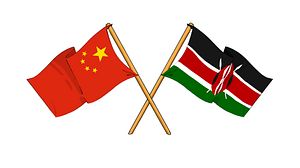China’s Road and Bridge Corporation (CRBC) struck a deal with Kenya to launch a new and improved railway that will link the city of Mombasa to the capital Nairobi. The railway project is also going to extend to neighboring countries. The railway will carry freight trains at speeds of up to 80 kilometers per hour, reducing the current 36-hour trip by rail to eight hours and dramatically reducing transport cargo costs. Passenger trains will go up to 120 kilometers per hour, cutting travel time down from 14 hours to four. Also, at present, the cost of importing goods to Kenya is extremely high. This project should reduce the cost of imported goods for the average Kenyan buyer.
The flagship railway project is set to cost $13.8 billion. However, China is only funding the section from Mombasa to Nairobi, which is expected to be completed by 2017. After this, it will be extended through Uganda, with lines to the capital of Democratic Republic of Congo, through Rwanda to Burundi and South Sudan.
This is a major part of Kenya’s Vision 2030 plan to ensure the development of the country and strengthen economic performance. The aim is for a GDP growth of 10 percent annually, although the economy is only expected to grow at roughly six percent this year. These transport links will better integrate Kenya’s northern ethnic communities, who have been historically excluded from the country’s national life, with better access to resources and opportunities. Given recent ethnic clashes in the country’s north, the China-Kenya deal can help increase investments in the population’s livelihood and possibly deter future violence.
Kenya is hoping to boost its position as an African economic powerhouse and improve intra-regional trade, making East Africa a leading investment destination. But what’s in it for the Chinese?
China already has a significant presence in Kenya. China is Kenya’s largest source of foreign direct investment and the country’s second largest trade partner. Kenya is East Africa’s largest economy and has shown impressive oil discoveries as of late. Oil drillers discovered that hidden beneath Kenya’s Great Rift Valley lie 10 billion barrels. This makes Kenya a serious player in the emerging oil industry. This major $5 billion deal will help China build more support in Africa and will curry diplomatic favor as it looks to get its hands in Kenya’s emerging resources market.
In order to sustain its rapid growth, China has looked to Africa for its oil as well. In neighboring Uganda, the Chinese are providing investment in improving electricity generation and transportation. This Chinese-built infrastructure will not be paid in advance, but repaid from future oil revenue. In Angola, China has also helped build infrastructure in exchange for oil.
But Sino-African relations have also seen some resistance. In Chad, when it was discovered that a Chinese state-owned oil company was dumping spilled crude oil in ditches, operations came to a halt. Earlier this year, Gabon withdrew the right of Addax Petroleum, a subsidiary of Sinopec, to operate in the nation’s oilfields, raising questions about China’s investments in the region.
Hopes are high in Kenya that this railway will help transform the country and region, and China has the money and technical know-how to make it happen. Still, some have griped about the opaque handling of the contract. Also, trade is tilted in China’s favor. Kenya exported $50 million of produce to China in 2012, while buying $1.8 billion worth of Chinese goods.
Replacing a neglected railway that was once under British colonial rule does raise some suspicions in the West that the Chinese are indeed the new colonizers. While not as ambitious in scope, China’s investments bring to mind Cecil Rhode’s Cape to Cairo Railway project, which attempted to connect the British Empire to Africa and foster trade. This included the Uganda railway, which would link Kenya and Uganda with the Indian Ocean and open up Africa’s interior. The costs of the project were enormous, and construction resulted in the deaths of some to 2,500 workers. Although the project was completed at the turn of the 20th century, it is today only a shadow of its former self. The railway today is barely fit to operate. But that’s all going to change.
In East Africa, the doubters are being won over and there is a lot of confidence that this project will be completed as scheduled. If it helps transform the region into a self-sustaining economic investment hub — and it doesn’t turn out to be a raw deal — other African nations will continue to look East. They too will want to be part of Africa’s economic turnaround.
































